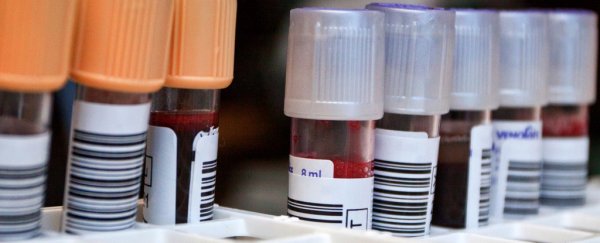A cancer researcher in Texas has been caught red-handed after fraudulently using her own blood in place of samples from nearly 100 other people.
Maria Cristina Miron Elqutub, a former research assistant at the University of Texas's MD Anderson Cancer Centre, has admitted she falsely substituted and labelled her own blood to represent samples taken from 98 participants in a cancer genetics study.
According to the US Office of Research Integrity (ORI), Elqutub "intentionally and knowingly" fabricated the samples, and while no patients are thought to have been directly affected, the deception is having a definite impact.
That's because the data Elqutub falsified ended up being used in two published studies – one in the journal Cancer, the other in PLOS One – which involved hundreds of cancer patients alongside hundreds of other healthy control subjects.
Now the scientific integrity of these compromised findings is being directly called into question.
Already, the Cancer paper – which sought to investigate how genetic variants modify the risk of developing salivary gland carcinomas (SGCs) – has been voluntarily retracted by its authors.
The retraction notice, issued in January, states that after the paper was published, "the authors discovered that, unbeknownst to them, the sampling had been compromised, resulting in duplicate samples involving 93 controls and 4 cases".
Pathologist Adel El-Naggar from the MD Anderson Cancer Centre, who was a co-author on both studies affected, told Retraction Watch his team detected "a discrepancy" when they used the fabricated blood samples in other research and realised something wasn't right.
"This is an unfortunate situation," he said.
On the other hand, the PLOS One study – which also looks at the role of genetic variants in SGCs – hasn't yet been retracted, and its findings (along with its unreliable dataset) are still viewable online with no disclaimer about Elqutub's now admitted infractions.
But that might not be the case for much longer.
As part of her negotiated settlement with ORI – the federal agency responsible for investigating this kind of scientific misconduct – Elqutub has voluntarily agreed to correct or retract the study.
Representatives for PLOS One, who say they only recently became aware of the issue, have stated they are currently evaluating the study, and hope to "identify a way forward soon".
Also as part of her settlement, Elqutub has agreed to have any future research she is involved with supervised for the next three years, alongside other related conditions.
After this debacle, though, it's unclear what kind of research, if any, that might be.
Elqutub is currently employed as a middle school nurse. She worked in a support position at the MD Anderson Cancer Centre in between 2010 and 2012, and her former employer has declined to comment on why her position there ended when it did.
Which forces us to wonder, who knew what? And when? But most importantly, why?
Why would Elqutub knowingly substitute her own blood in place of samples from almost 100 other people, including cancer patients? Was she trying to fix a mistake, or was it laziness, or did she wilfully do this for some other (possibly selfish) reason?
We may never know the answer, as information on this mystifying misconduct seems to be in pretty short supply.
Just as it's now shorter on salivary gland carcinoma too.
Thousands of people around the world develop the condition each year, and after this, we're down two studies – which means less reliable science for sick people to turn to. Let's hope scientists can change that soon.
